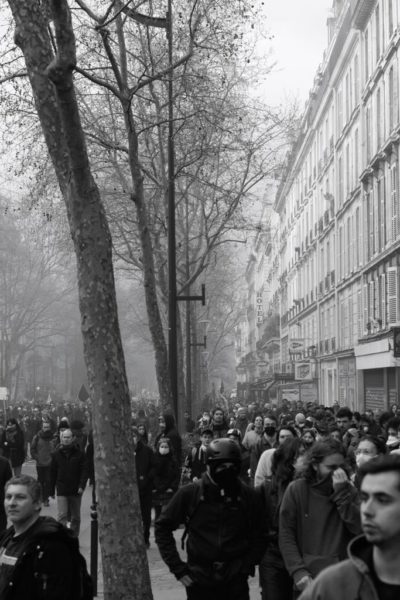Search

30.03.2023 / News /
“If we don’t change things today, they will never change”
A report on the explosive and historic mass mobilisation in France by UVW Executive Committee member, Eraldo Strumiello, 31st March 2023
On Tuesday, 28 March, the 11th day of mobilisation took place in France, which not only demands the withdrawal of the pension reform, but also brings together the demands of different social sectors hit by the crisis and by the plans of the Macron government.
The government reforms, among other things, include a delay in the retirement age from 62 to 64 years and the lengthening of the minimum contribution period.
It is estimated that on this day, 750,000 people took to the streets, with demonstrations in more than 80 towns across the country and during ongoing key strikes, such as those of oil workers and garbage collection workers.
We may be seeing an explosive and historic mass mobilisation.
France is experiencing a new wave of mobilisations because of the fight against the pension reform that many already compare with the fight of May 1968. Initially, these mobilisations led by the several unions (CGT, CFDT, FO, SUD, CFTC) saw millions of people take to the streets.
However, the mobilisation became massive and radicalised as of Friday, March 17, because of the use of special constitutional powers, Article 49.3, that allows the government to pass a bill without going through a parliamentary vote.
In response to the use of Article 49.3 there were spontaneous protests in dozens of French cities that same night, and during the following weekend the unions called for local actions to channel anger. Demonstrations often ended in very harsh confrontations with the police, with attacks on the buildings of the mayors’ offices and the offices of the deputies of the Macron coalition.
On Thursday the 23March, a day of demonstrations took place that saw 3.5 million people, according to the unions, in the streets, and direct actions in the form of roadblocks, hours of disruption at Charles de Gaulle airport and dozens of railway stations, reinforced blockades of refineries and other logistics centres.
The youth are determined to play a role in not only fighting for the withdrawal of the reform, but also deeper change in the country. As many young people say, “if we don’t change things today, they will never change.”
Little by little workers self-organisation is advancing to make the existing strikes effective and lead them from the bottom up. Workers are also beginning to discuss how to extend the strike to more sectors, there are sectors that have begun to declare “wild strikes” without even following the necessary legal process, as is the case of the railway workers at the SNCF technical centre in Châtillon, which have inspired another railway centre in Lyon.
What is proposed today in France is not only the withdrawal of the reform, but also an increase in wages, the defence of the democratic right to demonstrate and strike, and the end of police repression.
Already at 8 in the morning when I left the hotel for a coffee, young high school students from the nearby school could be observed standing on garbage cans that were full from the sweepers’ strike speaking to a small crowd of other students.
A huge demonstration took place at 2 in the afternoon in the Plaza de la República. Little by little, the loud cars of the unions and activist groups were setting the scene around the square.
I watched as people came up with handmade banners with messages for the government. In a short time, Praça da República was taken over by the people. I could feel the energy in the air, I knew I was amongst compañeros.
From the sides, you could see the different union blocs starting a march of over three kilometres towards the Place de la Nation.
Very excited and with the certainty that it is possible to defeat this government policy, around 7 at night, with the Plaza de la Nación already full, I could see thousands of people arriving. It was amazing.
I think we should follow this process in France because the policy of extending working time for retirement is the policy of most governments, including here in the UK. I read an article today in the Guardian newspaper that points to a momentary withdrawal by the British government in relation to changes to the retirement system here, obviously predicting a similar reaction to what is happening in France.
Here we have skyrocketing inflation and a various struggles for wage recovery that began last July with railway workers and spread to other sectors, including the public sector such as health and education. We must stand in solidarity with the French workers and draw all the lessons from this process.
If they win there, it is also our victory, and we can win here too.











25.06.2025 / Justice for Cleaners / St Helier and Epsom

12.06.2025 / Natural History, Science and V&A Museums